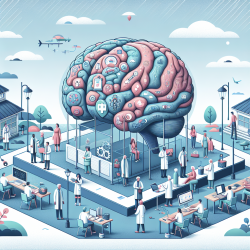The 2022 Symposium on Dementia and Brain Aging in Low- and Middle-Income Countries (LMICs) has shed light on several critical areas of research, diagnosis, care, and impact. For practitioners working with children, particularly in LMICs, these insights can be pivotal in improving skills and outcomes. The symposium underscored the necessity of LMIC-focused research to ensure that dementia care is inclusive and reflective of diverse populations. Here, we delve into the symposium's key outcomes and how they can be applied in practice.
Understanding the Landscape
The symposium highlighted the disproportionate impact of dementia on LMICs, where two-thirds of people with dementia reside. Despite this, most research and resources are concentrated in high-income countries (HICs). This imbalance calls for a targeted approach to dementia research in LMICs to develop effective preventive, diagnostic, and therapeutic strategies.
Key Outcomes and Recommendations
- Modifiable Risk Factors: The symposium emphasized the importance of identifying and targeting modifiable risk factors such as diet, physical activity, hypertension, social networks, and sensory impairments. For instance, promoting healthy diets and physical activity can significantly reduce dementia risk.
- Vascular Cognitive Impairment and Stroke: Vascular dementia (VaD) is more prevalent in LMICs, accounting for about 30% of dementia cases. Early identification and management of cardiovascular risk factors are crucial.
- Human Immunodeficiency Virus (HIV) and Dementia: The prevalence of HIV-associated neurocognitive disorder (HAND) is high in LMICs. Improved diagnostic criteria and early intervention can help manage cognitive decline in people living with HIV.
- Language and Aphasia: Speech and language deficits are early indicators of cognitive impairment. Developing culturally sensitive assessment tools and interventions is essential for accurate diagnosis and treatment in diverse populations.
- Genetics of Dementia: Genetic research in diverse populations can uncover unique risk factors and protective variants, leading to more effective therapies. For example, studies in Colombia have identified genetic mutations associated with early-onset familial Alzheimer's disease.
- Cognitive Testing and Diagnosis: Early and accurate diagnosis is critical. Validating and culturally adapting cognitive tests for use in LMICs can help reduce underdiagnosis and improve care.
- Biomarkers and Biobanking: Developing cost-effective and feasible biomarkers in LMICs can enhance early diagnosis and monitoring of dementia. Establishing biobanks in these regions can provide valuable insights into disease pathology.
- Dementia Care and Policy: Implementing culturally appropriate dementia care policies and reducing stigma are essential for improving care outcomes. National and international collaborations can help build research capacity and share resources.
Practical Applications for Practitioners
Practitioners can leverage these insights to enhance their skills and improve outcomes for children in LMICs. Here are some actionable steps:
- Focus on Modifiable Risk Factors: Educate families about the importance of a healthy diet, physical activity, and managing cardiovascular health to reduce dementia risk.
- Early Diagnosis and Intervention: Utilize culturally adapted cognitive tests and biomarkers for early detection and intervention.
- Language and Communication: Develop speech and language therapy programs that consider linguistic diversity and bilingualism.
- Collaboration and Training: Engage in national and international collaborations to stay updated on the latest research and best practices. Participate in training programs to enhance skills in dementia care.
To read the original research paper, please follow this link: The 2022 symposium on dementia and brain aging in low- and middle-income countries: Highlights on research, diagnosis, care, and impact.










